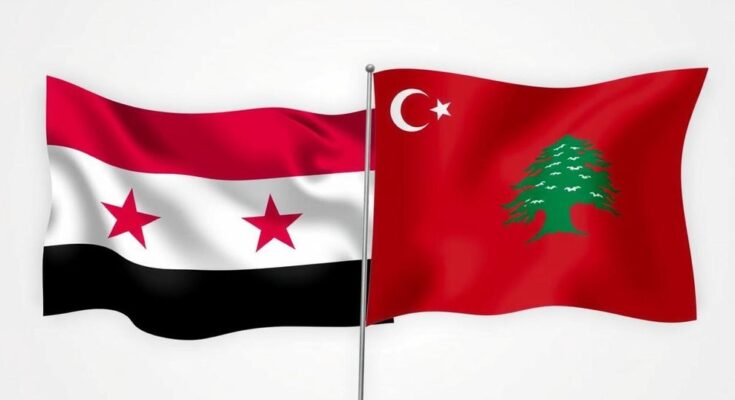In an historic visit, Syria’s new leader Ahmed al-Sharaa and Lebanon’s Prime Minister Najib Mikati pledged to foster long-term strategic relations following the ouster of Bashar al-Assad. Both emphasized the need for dialogue and cooperation on issues such as the Syrian refugee crisis and border delineation. Sharaa expressed hopes for a new era of stability with Lebanon’s President Joseph Aoun and prioritized mutual respect in restoring ties between the neighbors.
Syria’s newly appointed leader, Ahmed al-Sharaa, alongside Lebanon’s Prime Minister Najib Mikati, declared their commitment to fostering enduring relations between the two nations following the ousting of Bashar al-Assad. During Mikati’s historic visit to Damascus, the first by a Lebanese prime minister since the onset of the Syrian civil war in 2011, both leaders emphasized the significance of mutual respect and the importance of addressing shared interests through dialogue. Sharaa articulated a desire for positive relations, stating, “There will be long-term strategic relations between us and Lebanon. We and Lebanon have great shared interests.”
The deteriorating relationships of the past, marked by Hezbollah’s support for Assad and the absence of contact between the nations, seem to be transforming. With Lebanon’s recent election of President Joseph Aoun, Sharaa expressed optimism for enhanced stability, adding that efforts would be made to establish equality and resolve issues through negotiation. The presence of approximately two million Syrian refugees in Lebanon, a matter of pressing concern, has been acknowledged as vital for both countries, with Mikati labeling their return as “an urgent matter in the interest of both countries.”
Mikati also suggested the establishment of a joint committee to delineate land and sea borders, a point that has remained contentious during Assad’s administration. This initiative holds particular importance as Lebanon seeks to initiate offshore gas exploration. Furthermore, the prime minister remarked on the necessity for stricter control over border crossings to mitigate smuggling activities, a longstanding issue exacerbated by the porous nature of the border. Recently, Syria imposed entry restrictions on Lebanese citizens, limiting their unfettered access, highlighting the complexities in ongoing bilateral interactions.
The international community is taking renewed interest in Syria, with various foreign dignitaries visiting Damascus since the regime change. These developments underscore the shifting geopolitical landscape in the region as Syria reestablishes its relationships in light of recent events.
The geopolitical dynamics of Syria and Lebanon have been heavily influenced by the tumultuous history of the Syrian civil war, which began in 2011. During this conflict, Syria exerted considerable influence over Lebanon, particularly through Hezbollah, which maintained support for Assad’s regime. The recent ousting of Bashar al-Assad has catalyzed a reevaluation of relationships between the two nations. With a new leadership in Syria, efforts are underway to mend ties that had soured amid regional tensions and economic crises affecting both countries.
In conclusion, the recent visit of Lebanese Prime Minister Najib Mikati to Syria symbolizes a significant shift in relations between Syria and Lebanon following the ouster of Bashar al-Assad. Both countries are expressing a desire to resolve longstanding issues through dialogue and mutual respect while seeking to manage the refugee crisis and establish clear borders. This development marks a hopeful chapter in a historically complex relationship, emphasizing strategic cooperation and shared interests.
Original Source: www.france24.com




